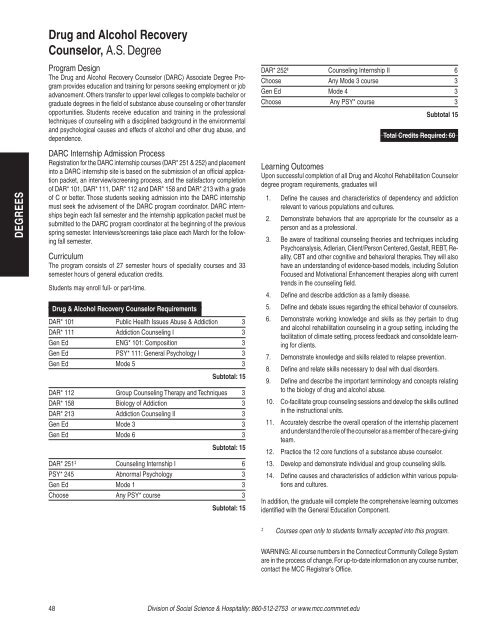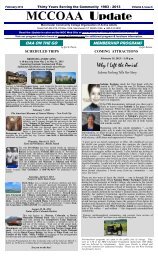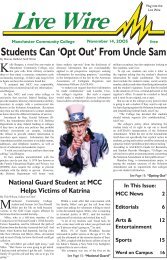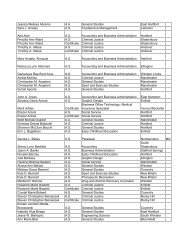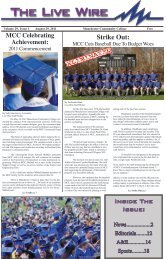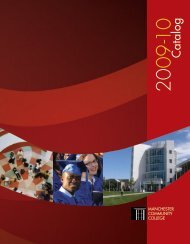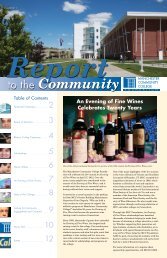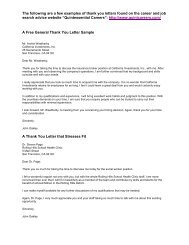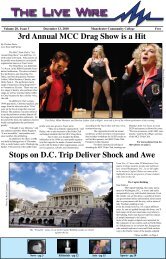Liberal Arts and Science - Manchester Community College ...
Liberal Arts and Science - Manchester Community College ...
Liberal Arts and Science - Manchester Community College ...
Create successful ePaper yourself
Turn your PDF publications into a flip-book with our unique Google optimized e-Paper software.
DEGREES<br />
Drug <strong>and</strong> Alcohol Recovery<br />
Counselor, A.S. Degree<br />
Program Design<br />
The Drug <strong>and</strong> Alcohol Recovery Counselor (DARC) Associate Degree Program<br />
provides education <strong>and</strong> training for persons seeking employment or job<br />
advancement. Others transfer to upper level colleges to complete bachelor or<br />
graduate degrees in the field of substance abuse counseling or other transfer<br />
opportunities. Students receive education <strong>and</strong> training in the professional<br />
techniques of counseling with a disciplined background in the environmental<br />
<strong>and</strong> psychological causes <strong>and</strong> effects of alcohol <strong>and</strong> other drug abuse, <strong>and</strong><br />
dependence.<br />
DARC Internship Admission Process<br />
Registration for the DARC internship courses (DAR* 251 & 252) <strong>and</strong> placement<br />
into a DARC internship site is based on the submission of an official application<br />
packet, an interview/screening process, <strong>and</strong> the satisfactory completion<br />
of DAR* 101, DAR* 111, DAR* 112 <strong>and</strong> DAR* 158 <strong>and</strong> DAR* 213 with a grade<br />
of C or better. Those students seeking admission into the DARC internship<br />
must seek the advisement of the DARC program coordinator. DARC internships<br />
begin each fall semester <strong>and</strong> the internship application packet must be<br />
submitted to the DARC program coordinator at the beginning of the previous<br />
spring semester. Interviews/screenings take place each March for the following<br />
fall semester.<br />
Curriculum<br />
The program consists of 27 semester hours of speciality courses <strong>and</strong> 33<br />
semester hours of general education credits.<br />
Students may enroll full- or part-time.<br />
48<br />
Drug & Alcohol Recovery Counselor Requirements<br />
DAR* 101 Public Health Issues Abuse & Addiction 3<br />
DAR* 111 Addiction Counseling I 3<br />
Gen Ed ENG* 101: Composition 3<br />
Gen Ed PSY* 111: General Psychology I 3<br />
Gen Ed Mode 5 3<br />
Subtotal: 15<br />
DAR* 112 Group Counseling Therapy <strong>and</strong> Techniques 3<br />
DAR* 158 Biology of Addiction 3<br />
DAR* 213 Addiction Counseling II 3<br />
Gen Ed Mode 3 3<br />
Gen Ed Mode 6 3<br />
Subtotal: 15<br />
DAR* 251 ‡ Counseling Internship I 6<br />
PSY* 245 Abnormal Psychology 3<br />
Gen Ed Mode 1 3<br />
Choose Any PSY* course 3<br />
Subtotal: 15<br />
DAR* 252 ‡ Counseling Internship II 6<br />
Choose Any Mode 3 course 3<br />
Gen Ed Mode 4 3<br />
Choose Any PSY* course 3<br />
Subtotal 15<br />
Total Credits Required: 60<br />
Learning Outcomes<br />
Upon successful completion of all Drug <strong>and</strong> Alcohol Rehabilitation Counselor<br />
degree program requirements, graduates will<br />
1. Define the causes <strong>and</strong> characteristics of dependency <strong>and</strong> addiction<br />
relevant to various populations <strong>and</strong> cultures.<br />
2. Demonstrate behaviors that are appropriate for the counselor as a<br />
person <strong>and</strong> as a professional.<br />
3. Be aware of traditional counseling theories <strong>and</strong> techniques including<br />
Psychoanalysis, Adlerian, Client/Person Centered, Gestalt, REBT, Reality,<br />
CBT <strong>and</strong> other cognitive <strong>and</strong> behavioral therapies. They will also<br />
have an underst<strong>and</strong>ing of evidence-based models, including Solution<br />
Focused <strong>and</strong> Motivational Enhancement therapies along with current<br />
trends in the counseling field.<br />
4. Define <strong>and</strong> describe addiction as a family disease.<br />
5. Define <strong>and</strong> debate issues regarding the ethical behavior of counselors.<br />
6. Demonstrate working knowledge <strong>and</strong> skills as they pertain to drug<br />
<strong>and</strong> alcohol rehabilitation counseling in a group setting, including the<br />
facilitation of climate setting, process feedback <strong>and</strong> consolidate learning<br />
for clients.<br />
7. Demonstrate knowledge <strong>and</strong> skills related to relapse prevention.<br />
8. Define <strong>and</strong> relate skills necessary to deal with dual disorders.<br />
9. Define <strong>and</strong> describe the important terminology <strong>and</strong> concepts relating<br />
to the biology of drug <strong>and</strong> alcohol abuse.<br />
10. Co-facilitate group counseling sessions <strong>and</strong> develop the skills outlined<br />
in the instructional units.<br />
11. Accurately describe the overall operation of the internship placement<br />
<strong>and</strong> underst<strong>and</strong> the role of the counselor as a member of the care-giving<br />
team.<br />
12. Practice the 12 core functions of a substance abuse counselor.<br />
13. Develop <strong>and</strong> demonstrate individual <strong>and</strong> group counseling skills.<br />
14. Define causes <strong>and</strong> characteristics of addiction within various populations<br />
<strong>and</strong> cultures.<br />
In addition, the graduate will complete the comprehensive learning outcomes<br />
identified with the General Education Component.<br />
‡ Courses open only to students formally accepted into this program.<br />
WARNING: All course numbers in the Connecticut <strong>Community</strong> <strong>College</strong> System<br />
are in the process of change. For up-to-date information on any course number,<br />
contact the MCC Registrar’s Office.<br />
Division of Social <strong>Science</strong> & Hospitality: 860-512-2753 or www.mcc.commnet.edu


